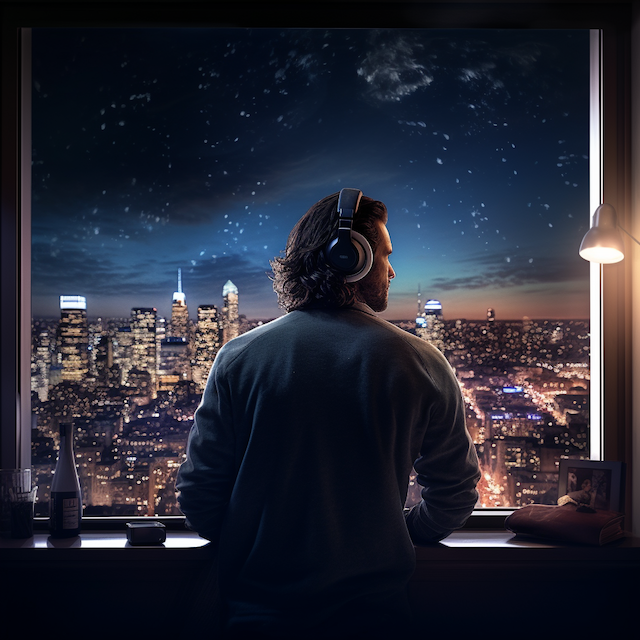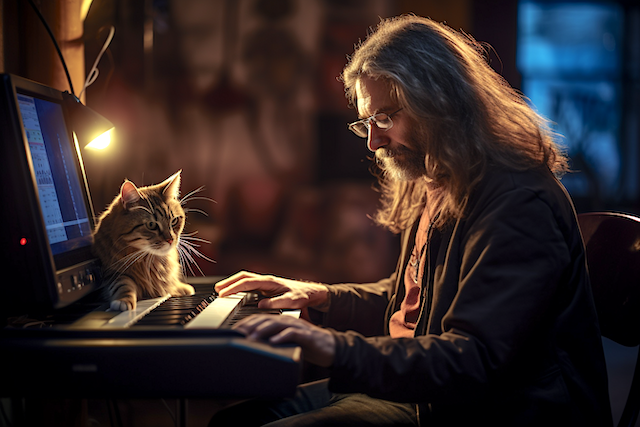
the pictures in this post are Midjourney AI’s attempts to mash-up two selected elements of my Ikigai; other than these three images, Midjourney did not do particularly well; these are my own prompts
I’ve written several times on the subject of what we pay attention to. Much has been written about how what we “choose” to pay attention to determines what we do and ultimately who we are.
That’s an appealing sentiment, but I think it gets it precisely backwards. It’s our conditioning — biological and cultural — that determines what we pay attention to. It is not a “choice”. The only thing ‘we’ can do about it is to be occasionally aware of what we are (and aren’t) paying attention to. (And of course, if you want to go further down that rabbit hole, we have no choice about what we are aware of, or become aware of, either.)
The people closest to me — those who I suppose have had the largest impact on my conditioning over the past decade or so — have generally been quite forward, and quite articulate, in telling me when I have not been paying attention, and pointing out what I have apparently missed through my inattention (or misdirected attention).
What I have missed, mostly, I think, is what Annie Ernaux calls “the pure immanence of the moment” — not the external analysis, memory or making-sense of the moment, but its simple ‘beingness’, independent of mental constructs about it and what it might ‘mean’. Perhaps this is what Russell Hoban meant when he wrote about “the moment under the moment”, which a reviewer of his work describes as “the reality underneath the one we’re aware of”. Though my sense is that this reality is not so much ‘within’ or ‘underneath’ what we conceive of as real, as it is the ‘natural reality’ that is staring us in the face but is veiled and concealed from us by our sense-making selves ‘protecting us’ from it, in all its raw, inescapable, uncontrollable and awesome wonder (and sometimes horror).

So though I seem inherently inattentive (and I could make up a dozen explanations for that tendency, mostly having to do with life-long conditioned fear), my conditioning lately seems to be to ‘catch myself’ not paying attention. That doesn’t make me any more attentive, but it seems to be useful to know a little bit more about how this strange body, and stranger self, appear to function.
And I sense that I get closest to the ‘pure immanence of the moment’ when I am, for whatever reason, being my most attentive, and least caught up in my thoughts and in my head.
As an example of this: One of my joys these days is combining two aspects of my Ikigai (defined as the list of things that make me want to get up and start my day, and that bring simple pleasure and joy to my life):
- my favourite music
- hedonistic pleasures (eg hot baths by candlelight; Ayurvedic massage)
- just being in a state of equanimity, curiosity, and discovery
- clever humour and theatre
- play (board games, flirtations, exploring ideas, clever exchanges, challenging puzzles, pick-up sports where no one keeps score, and collaborative creative activities)
- the view from my apartment
- tropical ocean beaches and tropical rainforests
- my few true friends and small blog community
- the more-than-human world
- gentle, joyful, exceptionally bright/perceptive people
- reading and writing in order to learn new things
- my creative writing (words and music)
So often at midnight, with the day’s chores behind me and my body starting to relax and think about sleep, I stand by my living room window and look out at the city lights spread out below, and listen to “My Station” — an endless list of songs that Apple Music draws partly from my music library and partly from its recommendation engine, so I never know what song is coming next. And there is a period when I’m thinking about the music — the lyrics and what they might mean, and the memories the song stirs up. And then that thinking seems to stop, and I’m actually just listening to the music. Noticing the instruments coming in, the harmonies and counterpoint and the change in tempo or key, that I’d never noticed before. Not in an analytical way, but simply in an attentive way.
Something strange happens then. When I’m thinking about the music, I’m prone to hit the ‘forward to next song’ button when a song doesn’t immediately appeal to me. But when I stop thinking and just listen, every song suddenly seems beautiful, artful, and astonishing, and I have to stop myself from adding them all to my music library (and later suffering ‘buyer’s remorse’).
When I am just listening, I cease to be aware of myself, of time passing, or of anything else that is self-referential. At these (immanent?) moments there is only what is happening. There is no ‘intervention’, no sense-making, no ‘relating’ the music to my experiences or memories or mood.
And I realized, looking at my Ikigai list, that there is something almost everything on this list has in common: Almost all of these things can dissolve, and even temporarily erase, my sense of self, and what is left, without ‘me’, is a world that is boundless, edgeless, timeless, and utterly astonishing. I think we’ve all had ‘in the moment’ experiences like this.

Engaged in these activities, ‘I’ — by which I mean this sense of separateness and physical substance and agency that presumes to inhabit and control this body — just disappear. ‘I’ get lost in ‘the moment’. What is most remarkable about the “immanence of the moment” is that, apparently, there is no ‘one’ there.
And nearly everything ‘I’ seem to love to do (though it is probably actually this body that loves to do these things) seems to require ‘my’ absence. That is perhaps why ‘I’ am so drawn to the message of radical non-duality.
The strangest thing, which I only appreciated after I spoke to those (relatively few) who have permanently lost the sense of self and separation, is that the self is never missed. The body does just fine, regulating its billions of cells, and its resultant behaviour, without any need for this vexatious self that thinks itself so indispensable to the body’s safety and survival.
These ‘moments’ don’t seem to occur any more frequently than they ever did, but I do seem to notice them more. And damn I’ve tried a lot of ‘practices’ to try to learn to pay better attention to what’s happening in the moment, but I’ve largely given up — my self stubbornly insists on getting in the way, and it has shown no signs of leaving the building. I’ve even tried ‘not trying so hard’.
Somehow, though, it’s enough to just notice. The moments, I think, will always be there, just waiting for our attention. Waiting for us to get lost.





Dave, you wrote: “after I spoke to those (relatively few) who have permanently lost the sense of self and separation”
I am intrigued. How can you tell they have permanently lost the sense of self?
Thanks Dave for your beautifully written life line; for sharing the curves and bumps and the pleasures of free running as well as doubt and confusion. All very curative as we all know the power of happiness and how old habits tend to hang around even when we change In reading, awakens smiles of known feelings
Peter: Aw, thanks! Damn, I’d love to go visit with you some day, and get a sense of what it’s like to ‘be’ Peter.
Vera: Good question. I don’t think I’m very gullible or credulous, and my beliefs on this are always subject to change. With that caveat I guess my short answer would be:
(1) the many hours I have spent, one on one, talking with four of them, since 2016, and the hundreds of hours of videos I have watched — In every case, their statements and answers are consistent, modest, articulate and straight-forward, and they seem sincere and have no evident axe to grind; and
(2) the ‘glimpses’ I have had from time to time throughout my life when there was no sense of self or separation ‘here’, and where it was somehow ‘obvious’ that the sense of self and separation are completely illusory.
Appreciate the answer, Dave. I was not meaning to suggest they are out to deceive you.
What I mean with my question is this. Are they any different now that they have permanently lost the sense of self? Do they move though life differently, do they behave differently, do they relate differently on account of it? If they didn’t tell you, would you know?
Thank you for making it possible for me to finesse my question.
Vera, I actually asked them this, and also asked whether the people in their families have noticed any differences. And I actually had a long talk with one of them ‘before’ it happened, so I could see the apparent changes in beliefs and behaviours for myself.
I’d say that the changes to how they appeared to others happened gradually, and they’re rather subtle — so while there are still instinctive reactions of fear, anger, and horror, they seem to end very quickly, and there’s less and less of the lingering reactions like anxiety, neurosis, hatred, and other emotions that require personal judgement about what happened. And there’s clearly less concern about what other people think of ‘them’, though that doesn’t mean they suddenly become rude or insensitive.
Their way of saying this is that the person who ‘held on’ to that anxiety or hatred seems to have disappeared, so there’s no one ‘left’ to take ownership of these feelings. So when they’ve had a close shave eg rolling their car into a ditch after swerving to avoid an oncoming vehicle, there’s an immediate burst of fear and anger, and then, seconds later, it’s completely gone. There is no residual anxiety or hatred.
But because there’s a lifetime of memories that are imbued with personal reactions like anxiety and hatred, it seems to take some time for this transition to occur, I guess as the memories are reinterpreted by the brain through the new impersonal ‘no-self’ lens.
My ‘scientific’ interpretation of this (which they shrug off) is that something happened in the ‘default pathways’ in the brain that interpret sensory perceptions and process and make meaning of them. When the concept of the ‘real self’ and ‘real everything else’ is the basis of one’s model of reality, we see everything through that lens. If those pathways are disrupted, and suddenly there’s a different model of reality which does not include those concepts, everything is ‘seen’ differently, but the body continues to act and behave largely the same way it always did.
One analogy I have used is that of a person who has been blind from birth getting an operation (or a blow to the head) that suddenly give them sight. Their first reaction is likely to be overwhelm and confusion, as the model of reality they have constructed about what things ‘really’ must ‘look’ like is blown apart. But then they adapt, create new models, and carry on.